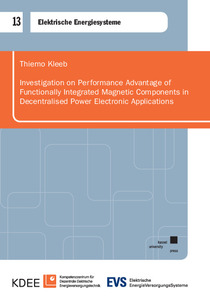| dc.date.accessioned | 2023-05-04T15:22:42Z | |
| dc.date.available | 2023-05-04T15:22:42Z | |
| dc.date.issued | 2017 | |
| dc.identifier | doi:10.19211/KUP9783737602273 | |
| dc.identifier.isbn | 978-3-7376-0227-3 (e-book) | |
| dc.identifier.uri | urn:nbn:de:0002-402279 | |
| dc.identifier.uri | http://hdl.handle.net/123456789/14654 | |
| dc.description | Zugleich: Dissertation, Universität Kassel, 2016 | ger |
| dc.language.iso | eng | eng |
| dc.publisher | kassel university press | |
| dc.rights | Urheberrechtlich geschützt | |
| dc.rights.uri | https://rightsstatements.org/page/InC/1.0/ | |
| dc.subject.ddc | 620 | |
| dc.title | Investigation on Performance Advantage of Functionally Integrated Magnetic Components in Decentralised Power Electronic Applications | eng |
| dc.type | Buch | |
| dcterms.abstract | The functional integration of magnetic components is a known technique in order to enable high power densities for power electronic converters. Magnetic components are mandatory in many power electronic converters and many topologies demand more than one magnetic component. Therefore, the functional integration of magnetic components allows realising several magnetic functions within one component. This technique promises lower total size, losses and costs without switching frequency increase. There are several examples in the literature for coupled inductors, common-differential-mode chokes or transformer-inductor components.One centralised question of this work is to explore the performance advantage of functionally integrated magnetic components in comparison to discrete components. Many applications allow the introduction of simple magnetic structures and standard cores or simple modifications of these (flux bypasses) in order to enable the required component behaviour. The design guidelines introduced in this work enable the design of functional integrated magnetic components with limited effort and, therefore, the application of components which enable superior performance regarding size and power loss for the applications. | eng |
| dcterms.accessRights | open access | |
| dcterms.creator | Kleeb, Thiemo | |
| dcterms.dateAccepted | 2016-09-02 | |
| dcterms.extent | 274 Seiten | |
| dc.contributor.corporatename | Kassel, Universität Kassel, Fachbereich Elektrotechnik / Informatik | ger |
| dc.contributor.referee | Zacharias, Peter (Prof. Dr.) | |
| dc.contributor.referee | Schulz, Detlef (Prof. Dr.) | |
| dc.publisher.place | Kassel | |
| dc.relation.isbn | 978-3-7376-0226-6 (print) | |
| dc.subject.swd | Dezentrale Energieversorgung | ger |
| dc.subject.swd | Leistungselektronik | ger |
| dc.subject.swd | Wandler | ger |
| dc.subject.swd | Magnetisches Bauelement | ger |
| dc.subject.swd | Integriertes Bauelement | ger |
| dc.subject.swd | Miniaturisierung | ger |
| dc.subject.swd | Verlustleistung | ger |
| dc.subject.swd | Bordnetz | ger |
| dc.subject.swd | Stromversorgung <Elektrotechnik> | ger |
| dc.subject.swd | Leistungsbewertung | ger |
| dc.type.version | publishedVersion | |
| dcterms.source.series | Elektrische Energiesysteme | ger |
| dcterms.source.volume | Band 13 | |
| kup.iskup | true | |
| kup.series | Elektrische Energiesysteme | ger |
| kup.subject | Naturwissenschaft, Technik, Informatik, Medizin | |
| kup.typ | Dissertation | |
| kup.institution | FB 16 / Elektrotechnik / Informatik | |
| ubks.nodoigen | true | |
| kup.binding | Softcover | |
| kup.size | DIN A5 | |


